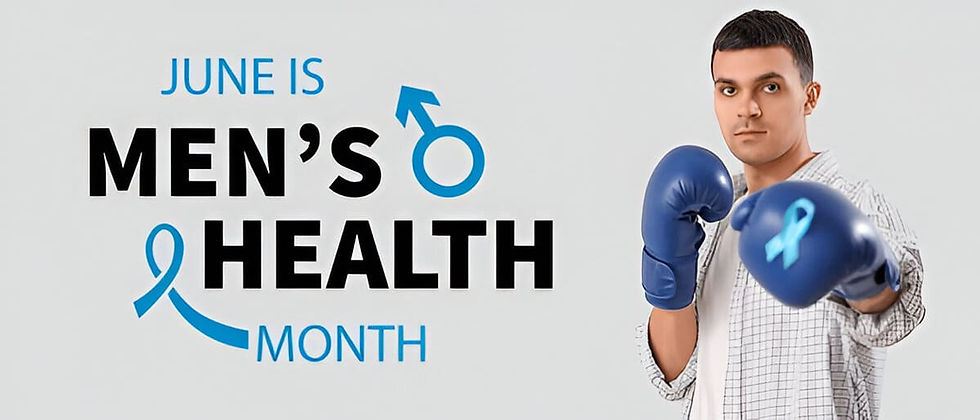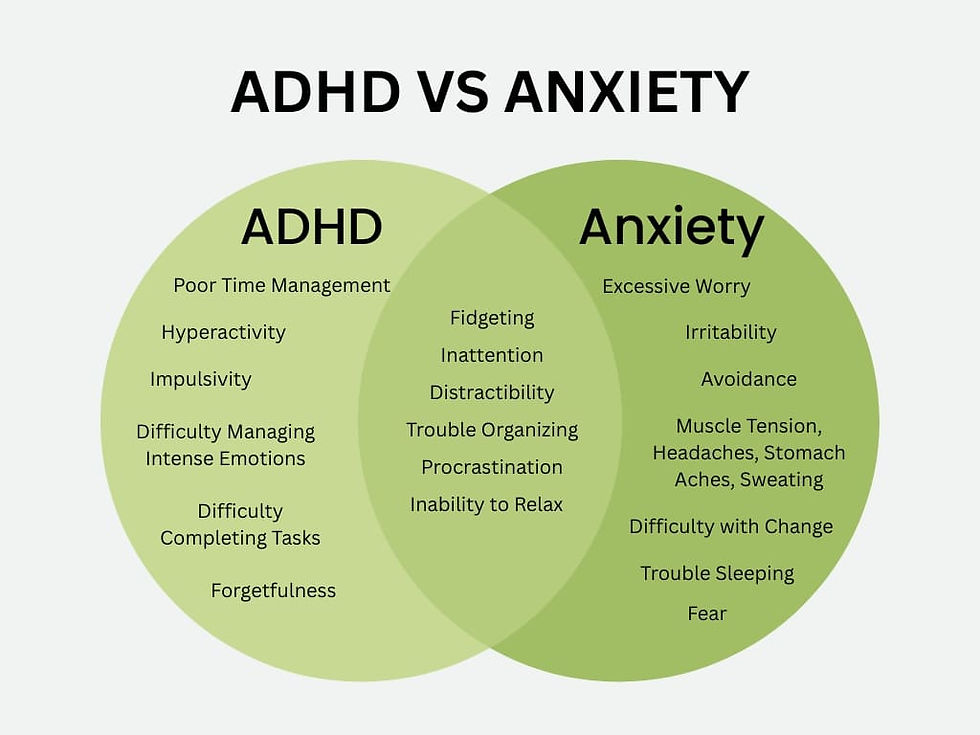Men's Mental Health Awareness Month
- 2628steph
- Mar 18, 2025
- 7 min read
Updated: Mar 21, 2025

Men’s Mental Health Awareness Month is a key time to focus on the mental health issues men face and to encourage open talks about their well-being. Even though awareness is growing, many men still struggle quietly because of social expectations and the shame tied to mental health. This month highlights that asking for help shows strength, not weakness.
Why Men’s Mental Health Matters
Mental health is as important as physical health, but men often don't seek help for mental health problems. Studies show that men are more likely to experience depression, anxiety, and substance abuse, but they are less likely to get diagnosed or treated. Also, suicide rates are higher in men than in women, so it's important to deal with these issues directly. We should encourage men to focus on their mental health and get help when necessary.
Common Mental Health Challenges Faced by Men
Men often face specific mental health problems because of societal pressures, stigma, and hesitance to ask for help. Some of the most frequent mental health problems are:
Depression
Many men face big problems with depression, but they often ignore or downplay the symptoms. These symptoms can show up in different ways, like being more irritable, feeling tired all the time, or losing interest in activities they used to enjoy.
Anxiety Disorders
Long-term stress and anxiety can show up in different ways, like feeling restless and having fast, uncontrollable thoughts. These mental health issues can cause physical symptoms and impact overall health.
Substance Abuse
Men often use alcohol or drugs to handle stress or emotional problems. This can lead to addiction and other health issues. Facing pressures at home and work, men might use substances to cope. Over time, this not only raises the risk of addiction but also causes physical health problems like liver damage, heart diseases, and mental health issues like anxiety and depression. Moreover, substance abuse can harm relationships and work performance, creating a cycle of stress and dependency.
Post-Traumatic Stress Disorder (PTSD)
Trauma from past events like military service, bad accidents, or different types of abuse can cause post-traumatic stress disorder (PTSD). This condition involves upsetting flashbacks, big mood changes, and avoiding social activities. PTSD can cause a lot of stress and disrupt daily life, so it's important to get help and treatment.
Work-Related Stress
The constant push to be financially stable and do well at work can cause a lot of stress, often leading to burnout and feeling emotionally drained. This stress usually comes from job demands, managing your tasks well, and wanting to move up in your career.
Emotional Suppression
Many men are often taught to hide their feelings. This cultural norm can make them feel alone because they might find it hard to connect with others emotionally. It can also make it difficult to build and keep healthy relationships.
Breaking the Stigma
The stigma around men's mental health often stops them from getting the help they need. Many men feel they must look tough and independent, which can make it hard to talk about feelings or weaknesses. It's important to break this stigma for better well-being.
1. Encourage Open Conversations
It's important to have open talks about mental health to make these issues seem normal. Talking about these topics helps create a space where people feel comfortable sharing their feelings and experiences, which can inspire others to get the help they need. This can reduce the stigma around mental health and encourage men to care about their well-being.
2. Challenge Societal Norms
By changing what it means to be masculine to include showing emotions, being open, and taking care of oneself, we can create a place where men feel more at ease and supported when talking about their mental health. This new way of thinking not only promotes better emotional habits but also helps remove the obstacles that have stopped men from getting the help they need.
3. Promote Professional Help
Getting therapy or counseling shows personal strength and resilience. It takes courage to ask for help and work on improving your mental health. This proactive step helps people tackle their problems and aids in their growth and development.
4. Support Networks
Friends, family, and support groups are important for creating a safe and friendly place where men can share their experiences, thoughts, and feelings. These networks offer a space without judgment, so people can express themselves openly and honestly.
Global Initiatives Supporting Men’s Mental Health
Many organizations around the world are helping to improve men's mental health, such as:
1. Movember Foundation
The Movember Foundation is a global effort that raises money and awareness for important men's health issues like mental health, suicide prevention, and overall well-being. They do this through fun events like "No-Shave November."
2. HeadsUpGuys
This is a Canadian program that provides a wide range of online resources. These resources have self-assessment tools and support systems designed to help men with depression. The program aims to create a supportive place where men can get the help they need to manage their mental health well.
3. Man Therapy
Man Therapy is a campaign in the United States that uses humor to talk about mental health. Its main goal is to help men notice and deal with mental health problems, encouraging them to take steps to improve their mental well-being. By using humor, Man Therapy aims to make mental health less scary and easier for men to talk about.
4. CALM (Campaign Against Living Miserably)
CALM is a UK-based group that helps with mental health problems and works to stop suicide. It has helplines for quick support, so people in crisis can get help right away. CALM also sets up support groups where people can talk about their experiences and get advice from others and experts. The group runs public awareness campaigns to teach people about mental health, reduce stigma, and encourage open talks about these important issues.
5. Beyond Blue
Beyond Blue is an Australian program that provides mental health education, crisis help, and resources to support men's mental health. It helps men identify mental health problems, find support, and improve their mental health. Beyond Blue aims to reduce the stigma around mental health and promote men's well-being.
How to Support Men’s Mental Health
Supporting men’s mental health requires action at both personal and societal levels. Here are some ways to help:
1. Encourage Open Conversations
It's important to make a place where men feel okay to talk about their feelings and problems. Let them know it's fine to share and they won't be judged. Listen carefully and give them support without needing to fix things right away. This helps build understanding and connection, which supports men's mental health and reduces stigma.
2. Promote Professional Help
Urge men to get help from skilled therapists, experienced counselors, or support groups when necessary. There are many resources to help, including online therapy that can be done from home.
3. Check In Regularly
Sending a quick text or making a phone call can really make a difference to someone. Stay in touch often to show you care. Ask about their life, work, or any problems they might have. Show genuine interest in how they're doing and let them know you care. This regular contact can make your relationship stronger and offer emotional support.
4. Challenge Stigma
We need to change the idea that men must always be tough and hide their feelings. By changing this, men can talk about their mental health openly and focus on self-care without worrying about being judged. Encouraging these talks helps remove harmful ideas and supports everyone's mental health. This creates a healthier society where men feel safe to ask for help and talk about their mental health issues.
5. Encourage Healthy Coping Strategies
Suggest doing positive things like regular exercise to feel better and stay healthy, or meditation to relax and clear the mind. Writing in a journal helps people express their thoughts and feelings. Hobbies are fun and reduce stress while improving well-being. Supporting healthy coping methods helps men deal with mental health issues in a positive and effective way.
6. Be Patient and Supportive
If a man in your life is struggling, remind him that he's not alone in facing his challenges. It's important to provide a listening ear and a comforting presence. Offering support without pressure can create a safe space for him, making it easier for him to open up and share his feelings when he feels ready. Encourage him gently and consistently, reassuring him that you're always there for him whenever he needs to talk or seek advice. This can make a big difference in helping him manage his mental health challenges.
If you or a loved one are struggling with mental health challenges, BFF Clinic is here to help. Our team of medical professionals is dedicated to providing compassionate care and personalized treatment. Contact us and schedule a consultation today to take the first step towards better mental well-being. We're here to support you and your loved ones every step of the way.
Conclusion
Men’s Mental Health Awareness Month is important for showing the mental health problems men face. It pushes us to better support men's mental health. By ending the stigma around mental health, spreading awareness, and providing easy-to-reach resources, we can build a society where men feel sure about asking for help. This effort focuses on their mental health, making sure they have what they need to live healthy and happy lives.
FAQs
1. Why is Men’s Mental Health Awareness Month important?
This month is important because it highlights the mental health problems men often deal with, like depression, anxiety, and suicide. By discussing these topics, we can lessen the stigma around mental health and urge men to focus on their well-being.
2. What are common mental health issues in men?
Depression, anxiety, substance abuse, PTSD, and stress-related disorders are the most common mental health problems in men. These problems can be caused by things like societal pressures, trauma, and genetics.
3. How can men prioritize their mental health?
Men can look after their mental health by seeing a therapist, making good friends, staying active, and taking care of themselves.
4. When is Men's Mental Health Awareness Month?
Men’s Mental Health Awareness Month is in June. It focuses on mental health issues in men and encourages them to seek help. Movember, in November, also highlights men's health, including mental health, by promoting discussions and activities to improve men's well-being. Both months are important for men's mental health awareness.
5. How can I support a loved one dealing with mental health issues?
To help a loved one with mental health issues, listen to them without judging, offer steady emotional support, and suggest they see a professional if needed. Also, keep in touch to show you care. Let them know you're there for them and they aren't alone.




Comments